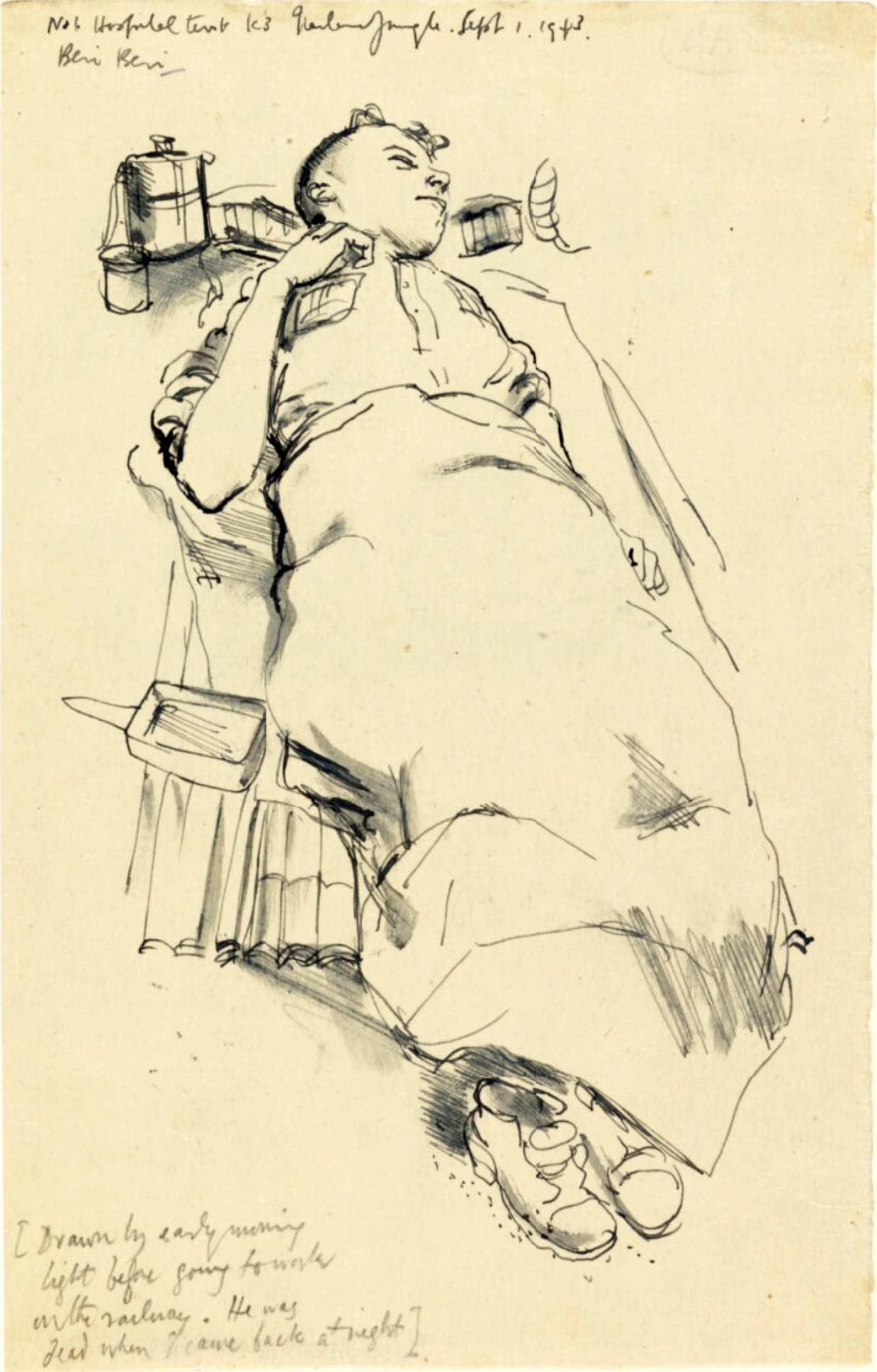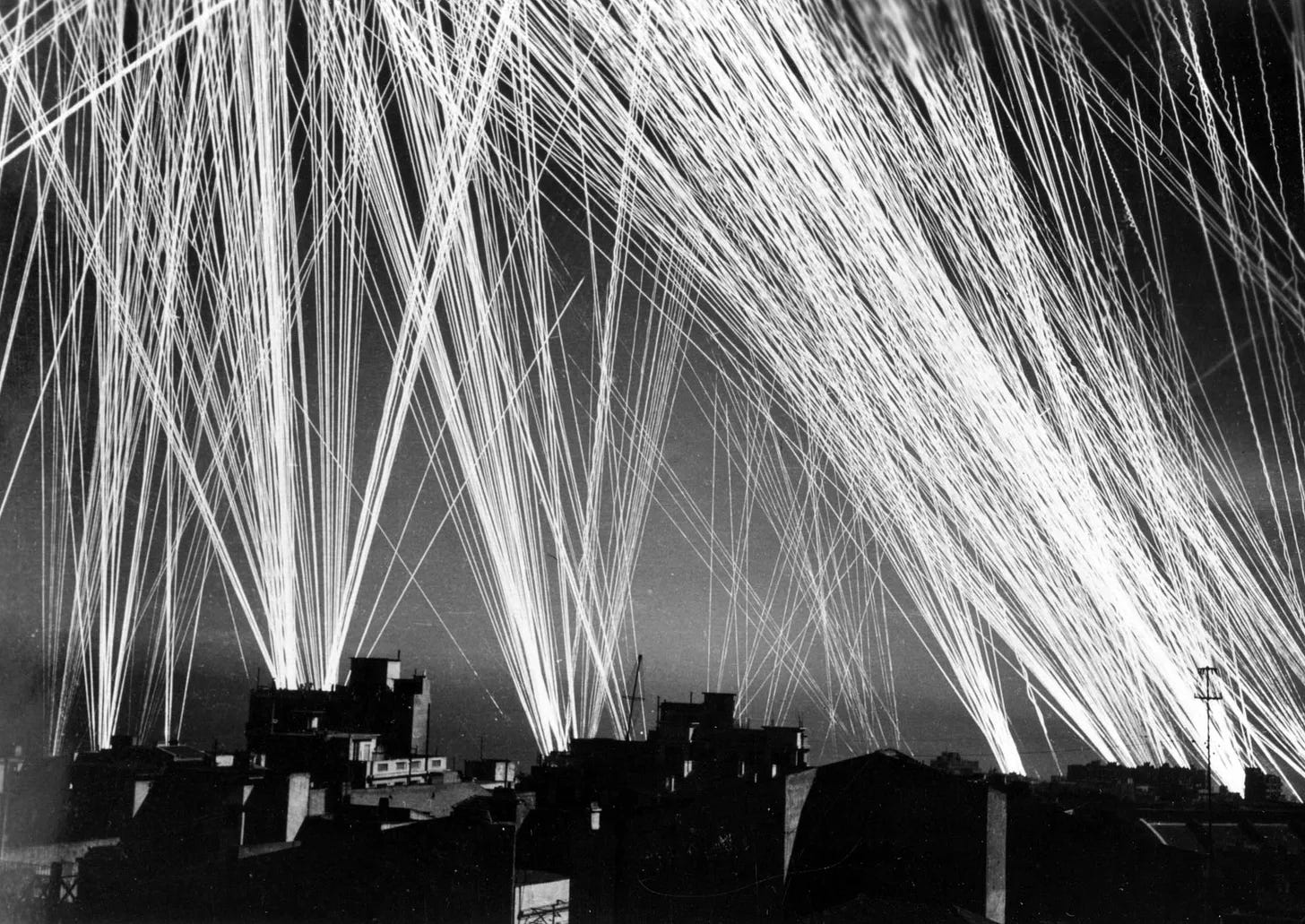The Last Days of Charles Weston
1st September 1943: As a wave of the terrible disease 'beri-beri' hits Allied POWs in the Far East, one man is left with only hope ...

[A sketch of a man lying on a bamboo bunk, covered with a blanket, a water canteen and cup by his bed, an empty mess tin by his side and his boots underneath the bottom of the bed. Annotated in pencil, lower left "Drawn by early morning light before going to work on the railway. He was dead when I got back at night."]
Charles Weston had served with the RAF in Malaya. He was amongst those who were evacuated from Singapore just before it fell, surviving the dive bombing of his ship which killed many others. They were evacuated to Java, now part of Indonesia, where he was eventually taken prisoner by the Japanese.
Then I get beri-beri which is a disease caused by deficiency of vitamins; it affects the nerves of the body and the tissues and usually begins in the ankles which become swollen and lose their sense of feelings. It may spread to other parts of the body and becomes dangerous if not treated in time.
He had maintained a fairly thorough diary during that period. Since becoming a PoW in March 1942 his diary had become less detailed and less frequent. By August 1943 he was just making notes.
In this camp prisoners were permitted to buy food from local people - but only those prisoners who were fit to work. After only a short time just a small proportion of men remained fit for work, the rest suffering from debilitating diseases. It seems the Japanese were not at all concerned about this - despite the alarming death rate.
These were Charles Weston’s diary notes from this period1:
Rumours of another move. We are formed into new sections and companies. This time we are going by boat and arrive at an island, one of the Amboine group called Haroekoe. We learn that we are to build a runway. Dysentery breaks out on board.
At Haroekoe there are huts but no bali bali [straw]. We sleep on the ground. Rain pours along the ground. We get soaked. There is no cookhouse. We get organised. Four cookhouse staff build a cookhouse but can only make pap.
Mud is everywhere. On the second day we get soup. After three days we start work on the drome. What a sight - two hills of solid coral that we have to level. We work in two shifts - 750 men - 6 a.m. until 12 p.m., and 750 men - 12 p.m. until 6 p.m.
Diarrhoea increases. Dysentery starts. Men going down right and left. After ten days, work at the drome is abandoned. Deaths several each day. The camp is split into two. One half a hospital, all men with dysentery and diarrhoea are taken in.
The other half of the camp who are the fit men, work in the camp, grave digging, making lavatories, looking after the sick and generally cleaning up. Men begin to die like flies. The rainy season is on.
Death roll is now 250, I am moved into the beri-beri ward. Those who are sick but can walk have to collect stones to make a road around the camp. Rough bali gives me hell but despite swollen legs I hope for the best.
Food is fair, pap for breakfast, rice and soup for dinner, vegetables are pretty good, and pork occasionally. After ten days work begins again. This time only 100 men available out of 2000. Natives are also working on the drome. Shop opens but only the fit can buy.
Deaths are five to ten a day. The workers’ food is good.Dysentery and beri-beri are still rife, about 1000 patients. Shop sells bananas, tobacco, other fruits and coconuts.
Rain every day. Working party pushed up to 200. Camp more like a camp nowadays. Maize and kidney beans used for soup which is poor and indigestible. Shop now sells dried fish, biscuits and cigarettes, ketchup, peanuts, pineapples and occasionally papaya.
We have boxed meat but very little fresh meat is available. We keep our pay for our food, make own tea and hot water is supplied.
Then I get beri-beri which is a disease caused by deficiency of vitamins; it affects the nerves of the body and the tissues and usually begins in the ankles which become swollen and lose their sense of feelings. It may spread to other parts of the body and becomes dangerous if not treated in time.
Death roll is now 250, I am moved into the beri-beri ward. Those who are sick but can walk have to collect stones to make a road around the camp. Rough bali gives me hell but despite swollen legs I hope for the best.
It is not known exactly when Charles Weston entered the camp 'hospital' but he died on 14th September 1943, aged 35. The cause of death was recorded as being from beri-beri. After the war his body was exhumed and he is now buried at Galala War Cemetery, Halahera Island, Dutch East Indies (now Indonesia).

This account appears in War's Long Shadow, Charlotte Popescu (ed.).
Recently on World War II Today:
The US Army in Algiers
28th August 1943: A vivid description of the 'GI's off duty in an international melting pot





